The International Community has Failed to Resolve Sudan’s Crisis
By Lt Gen. Abakar M. Abdallah and Jerry Gordon (May 2022)
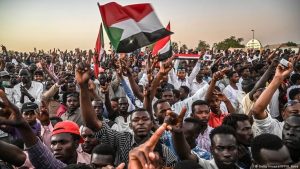
April 6, 2022, thousands protest in Khartoum demand civilian led authority: Source Arabiya TV
The Sudan military junta’s grip on power, lack of a functional government, continuing atrocities that causing rapid deterioration of economic conditions and security instability. What we are witnessing in Sudan’s political scene today is the old system of government on the verge of collapsing. The system has split into small, fragmented groups each trying to survive under the guise of revolution and assume control of the state. The Khartoum Nile Arab elite system of government that was formed at time of the country’s Independence in 1956 without the consent of the Sudanese people has fallen apart. The Arab tribal regime that was led by a coterie of people with Jihadist forbearers who imposed their identity by force on a majority black African indigenous population with multi-cultural background is now disintegrating. The strategy to implement their vision was whoever tried to resist this idea was to be exterminated.
With Islamist doctrinal objectives in mind, they fomented genocidal civil wars against Southern Sudanese in 1955. South Sudan seceded but surprisingly the policy of extermination of the indigenous population of Sudan continued in Darfur, Blue Nile, Beja (Red Sea Province) and the Nuba mountains. Successive Arab Nile valley elite regimes who ruled the country claimed the lives of some 2 million Southern Sudanese prior to their independence in 2011. An estimated 2 million more have been killed in the four indigenous conflict regions and the central region of the country. The policies formulated by tribal and religiously jihad-obsessed sheiks dominating the country’s indigenous population have brought Sudan to its current condition. A country rich in natural resources and diverse population became a failed state dependent on international relief aid for its survival.
International Community Approach to Resolve Sudan Crisis
The reality is that the Middle East oil-rich Arab states, especially the Emirates, Saudi Arabia, Egypt, the UN, African Union (AU) and the Intergovernmental Authority on Development (IGAD) have failed to resolve the Sudan crisis by returning to the period prior to the October 25, 2021, coup. Furthermore, they mistakenly thought they could maintain the military junta that possesses similar views of Arab supremacist ideology to remain dominant in power. The junta is continually committing genocidal war crimes and crimes against humanity in Sudan, notably in Darfur. The perpetrators of genocide cannot be part of the solution because they are the principal actors causing instability. Furthermore, the solution to Sudan’s crisis cannot come through Sudanese fractious political parties. They constitute a weak coalition motivated through personal family and tribal interests with allegiance to foreign Islamist religious sects and autocratic Arab Middle East oil-rich sheikdoms. Because of such behaviors, these Sudanese Nile Valley elitist parties never agree on anything. Notwithstanding, the genocidal security apparatus controlled by the military junta, remnants of the former Bashir-led Muslim Brotherhood regime, are by their nature subversive agencies who disrupt domestic peace and tranquility. Since the country’s founding and independence, Sudanese have never seen peace and stability under the regimes of these Islamist groups.
A good example are the political parties under the umbrella Forces of Freedom and Change (FFC) who joined hands with the Transitional Military Council (TMC) that killed hundreds of protesters and dispersed the protest-sit-in in Khartoum in December 2019. Members of FFC who represented the protesters during the negotiations did not protest the killings that occurred before the army headquarters. All while they quietly shared the government with the TMC. This and the October 25, 2021, coup by the junta leaders, caused the Sudan resistance forces to lose confidence in the military, rejecting sharing any government with them. They denounced Sudan’s old political parties and the FCC participation in any future government.
Instead of supporting this dysfunctional and pernicious system in Sudan, the international community should support resistance groups that espouse possible regime change. It should establish a transitional system of government under the rule of law accountable to a civilian authority to prepare the country for international supervised transparent democratic elections.
Through the United Nations Integrated Transition Assistance Mission in Sudan (UNITAMS); the international community has witnessed ongoing atrocities. The UNITAMS, operating under Chapter six of the UN mandate, has no powers to prevent the ongoing killings. Thus, the Special Representative of the Secretary General (SRSG) has no authority to stop the RSF/Janjaweed commanders from committing atrocities and causing political and social unrest disrupting the pastoral and economic livelihoods of people in Sudan. The SRSG, Mr. Volker Perthes,’ report to the UN Security Council on March 28, 2022, provided details on the deteriorating security situation and living conditions in Sudan under the October Coup junta. Similar to imprisoned former Sudan autocratic President Omar Bashir, the Chairman of Sudan’s Transitional Military Council, General Abdelfattah al Burhan protested the report findings accusing the UNITAMS SRSG of intervening in Sudan’s internal affairs. He called Perthes a liar and threatened to expel him from Sudan. This wasn’t the first time Sudan’s oligarchic rulers expelled a UN official. President Bashir expelled the UN Envoy Mr. Jan Pronk in October 2006, when he spoke about the government security forces committing brutal atrocities in Darfur. By threatening to expel a UN official, General Burhan is defying the international community by disregarding and dismissing the world order. Burhan brazenly reiterated that he would hand over power to anyone, except to an elected civilian government. A transition to a civil government that he dismantled and overthrew that effectively ceased to exist.
The regional and global organizations including UN, AU, as well as IGAD, have categorically failed to correctly address the root causes of Sudan’s crisis and find lasting solutions. Moreover, autocratic Middle East states in addition to Egypt have perpetuated Sudan’s dysfunctional regimes as reflective of their national interests. They fostered and supported successive failed autocratic regimes in Sudan since its independence. This policy was dramatically reflected in the overthrow of the Transition Sovereignty Council by the military junta in October 2021. The question is if this failed strategy did not work in the past, how can it work now?
These international groups want to solve the crisis by maintaining junta leaders Generals Burhan and Hemeti in power to be part of the solution, which is unacceptable. Their mediators presented proposals that did not answer the demands of Sudanese resistance groups for removal of the genocidal regime generals and barring Sudan’s corrupt political parties from participating in any future government. This is the main reason their efforts failed to develop lasting solutions. All Sudanese resistance groups, whether politicians, ordinary people, activists, social media, non-signatory armed resistance movements, including the Sudan United Movement, demand the military must cede power to civilian authority. Today’s Sudanese are wiser. They are aware of the tricks and deceptions played by the military generals and the political parties during the period of Sudan’s previous uprisings, especially during the December 2018 revolution.
As noted earlier Arab states have continually supported successive oppressive regimes in Sudan. They backed Bashir and the current military junta regime. Surprisingly, Israel condoned this through secret exchanges between Jerusalem and Khartoum in furtherance of realizing another Abraham Accord. All while ignoring the military junta killings of protesters and RSF/Janjaweed committing jihad against villages in Darfur. The Abraham Accords with majority Sunni Muslim Emirates and Kingdoms are vital to Israel as a bulwark against the hegemonic nuclear ambitions of the Shiite extremist Islamic Republic of Iran. In the case of Sudan, why support the junta’s genocidal exploitative policies when this Accord could only be realized through negotiations with a legitimate government elected and led by civilian authority?
We urge our Israeli brothers cease dealing with a military regime allied with Putin’s Russia whose paramilitary Wagner Group is training genocidal RSF/Janjaweed militias and other Sudan Security forces who continually attack and oppress the innocent people of Sudan. Moreover, Israel’s engagement with Sudan’s military junta implies support for the oppressive regime’s atrocities and death of innocent peaceful protesters. Instead, Israel should assist Sudanese resistance forces to put an end to the despotic regime facilitating transition to a democracy under the rule of law exemplified by Israel’s vibrant form of government.
Many thought that following RSF/Janjaweed commander and Coup leader Gen. Mohammed Dogolo aka Hemeti’s visit to Moscow coinciding with Russia’s invasion of Ukraine; the US would have reacted strongly. Washington’s silence was only broken on March 21, 2022, when the US Department of the Treasury’s Office of Foreign Asset Control (OFAC) imposed sanctions on Sudan’s Reserve Central Police (CRP) for human rights violations. The CRP was suspected of using overwhelming force against protesters. Despite the CRP being a minor force in Sudanese security forces structure; nevertheless, the action was a positive move by the US. OFAC recommended that the Biden Administration take additional strong sanctions against Sudan’s coup leaders to force them to relinquish transitional power to civilian authority. By remaining in control, Sudan’s military junta will simply adopt former President Bashir’s tactics that evaded US sanctions for over twenty years while he committed heinous crimes.
Release of Ghandour Conspiracy Enabling National Congress Party Return to Power
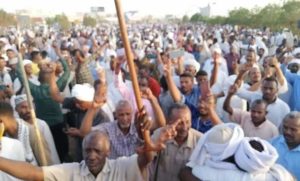
The military junta evaded at every turn its responsibility to create a civilian government; Instead, it actively supported the return to power of the National Congress Party (NCP). They released 12 top members of the NCP without answering for their crimes.
There is the example of Dr. Ibrahim Ghandour, who was accused of carrying out war against the state and supporting terrorism. Ghandour who was Sudan’s Foreign Minister during Bashir’s rule became the NCP leader following the fall of Bashir in April 2019. Ghandour, head of the dissolved National Congress Party, told Al Jazeera TV that his release on April 9, 2022, was an historic day. He praised the Sudanese judiciary system ignoring thousands of victims who have not seen justice in Sudan. Ghandour and 9 others were arrested and put in custody on November 19, 2020, accused of “provoking war against the state” , specifically a coup against the transitional authority. He was released briefly in October 2021 only to be imprisoned again. Why was he released in the first place? Among those released was the former Governor of East Darfur, Anas Omer, who was addressing a group of Janjaweed militias in May 2017 captured in a video clip saying “a bullet cost 7 Sudanese pounds which is more expensive than a rebel.” He ordered the RSF/Janjaweed militias to kill the captive rebels without using bullets and “leave them to vultures and Hyenas to eat them.”
Subsequent to the release of Ghandour, a meeting was held between the Political and Media Committee of the National Congress Party, RSF/Janjaweed and the Forces of Freedom and Change B Group represented by Mubarak Ardoul. Instructions to release 12 top members of the NCP from prison came directly from Hemeti. A Brigadier General, a commander in the RSF/Janjaweed stated during the meeting that the NCP will be part of the RSF/Janjaweed and they were to follow instructions from Hemeti. The General also indicated that they challenged both the judiciary and the army to release Ghandour and those with him without charges who were accused in a case punishable by death. Moreover, he said that according to the agreement, they will work with RSF/Janjaweed. This was not a surprise for Ghandour who praised Sudan’s corrupt judicial system. It was clear that he was just trying to cover up his release which had not come through the judiciary but came directly from the RSF/Janjaweed General Dogolo aka Hemeti’s orders. This cover up is consistent with tactics and tricks the NCP used to deceive the public.
The meeting also revealed that the military junta hired Russian media experts to work to enhance the image of Ghandour and his colleagues so that if they are released they would not face any criticism. This likely was the reason Ghandour was briefly released following the October 25, 2021, coup and imprisoned again. Russian media experts also worked with Sudanese social media to spread fake news. They funded the Presidential Palace protest sit-in supporting the military junta coup.
Based on arguments presented in the meeting, Russians may have funded the overthrow of Sudan interim Prime Minister Hamdok of the transitional government through two companies, Miro Gold, and Koch Mining. Russia was actively involved behind the October 25 coup that deposed the transitional civilian government.
The NCP is aware that the media continued to play a vital role mobilizing their supporters in the neighborhoods to attack the youth of the other political parties. Moreover, they formed media groups to work in neighborhoods and mosques so that they can control peoples’ committees in residential areas. They promised to provide benevolent services such as gas, bread, Zakat or charity, and a bag of food normally distributed to those who are fasting during Ramadan. Further they planned to infiltrate sports clubs and areas where communities gather. The NCP still maintains control of mosques through imams. The NCP leaders met with Russian politicians and media figures, discussing dates for release of all detainees. Their ultimate plan is to closely cooperate with Russia against the interests of the US and the West. After the release of Ghandour and his associates, the NCP members began speaking openly in public, mobilizing their supporters despite the NCP being banned by the Transitional Sovereignty Council in the aftermath of the military seizure of power in November 2019, while the military junta said nothing. On Monday April 18, 2022, they formed what is so-called in Arabic Language, Tayar Al Islami (The Broad Islamic Trend). It is an umbrella of Islamic movements incorporating 10 Muslim Brotherhood factions and splinter groups with the exception of the Popular Congress Party who refused to join. The ten factions include: “The Muslim Brotherhood – the Global Organization, The Muslim Brotherhood-Sudan, The Just Peace Platform, Sudanese Islamic Movement, al-Nahda Movement, The State of Law and Development Party, the Future Movement for Reform and Development, the Reform Now Movement, the National Justice Party, and the Islamic Unity Initiative. The goals of this new alliance are to foster Islamic religion in the Sudan and unite with the world Muslim Brotherhood movement. They also called for early elections in Sudan. Similar to previous NCP policies, they opened the door to join global Islamic movements.
Russia’s Wagner Mercenaries Operating in Africa
Since 2011, Putin and his close collaborators have planned to project Russia’s power by protecting Africa’s corrupt leaders who granted access to exploit mineral resources. They sought to impose their influence through deployments of the mercenary forces of Wagner Group that provide security protection to some of Africa’s most despotic corrupt leaders in exchange for precious natural resources.
In November 2017, Bashir met with Putin in Sochi suggesting to the Russian leader that Sudan would be Russia’s “Key to Africa.” The two leaders signed several deals including, economic, security cooperation and mining, as well as authorization for Russia to establish a naval base on Sudan’s Red Sea Coast.
As a consequence of the Bashir Putin agreements, private Wagner Group paramilitary cadres arrived in Sudan shortly thereafter engaging in training Sudan’s security forces including RSF/Janjaweed militias.
Russian companies began mining mineral resources in Sudan. Following Bashir’s collapse, the Wagner Group seized the opportunity and established close relationships with RSF/Janjaweed leader General Mohamed Hamdan Dogolo (Hemeti). Wagner Group began working at the gold mines of Jebel Amir, North Darfur and Songo, South Darfur. Hemeti established a base for the Wagner Group in Amdafock and began dispatching troops to the Central African Republic and later to Libya in 2020. Wagner mercenaries are currently operating in several countries in Africa including Mali, Sudan, Libya, CAR, Mozambique, and Madagascar.
Similar to RSF/Janjaweed atrocities in Darfur, Wagner mercenaries were accused of committing heinous crimes in the Central African Republic and Mali, respectively. On March 14, 2022, Russian Wagner Group forces in the CAR attacked gold mine workers in Andaha, Braio killing 16 people. Additionally, they seized gold, motor-cycles, and looted the market. Another incident occurred in Mali in which Wagner soldiers coordinated with Malian troops killed 300 civilians in Moura town during military operations between March 27 and 31, 2022. These people were summarily executed accusing them of being Islamic militants. The Human Right Watch announced that the incident was the single worst in its kind reported in the last 10 years.
RSF/Janjaweed continuing brutal attacks in South Darfur
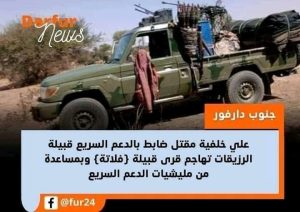
Control of natural resources may explain why the RSF/Janjaweed militias continue to wreak havoc in Darfur. Killing, raping, kidnapping, robbing, as well as appropriation of properties terrorizing and forcing villagers to leave these resource rich areas. Despite these continuing brutal atrocities in Darfur, the international community cares more about the Khartoum protests death toll that reached 93 since the October 25, 2021, coup.
By comparison in Darfur, over the period from March 27 to 31, 2022 over 200 people – children, women, and elders – were killed. Several Fulani villages were burned by RSF/Janjaweed militias under the cover of chasing outlaws and tribal clashes in South Darfur.
The aggressors are believed to be relatives of Hemeti who are new settlers in the District of Buram, South Darfur. They were armed men riding horses, camels, motor-cycles, and RSF/Janjaweed militias’ military trucks equipped with heavy weapons.
Attacks were carried out simultaneously in Sadoun, Shergeila and their surrounding areas targeting members of the Fulani ethnic group. According to Sudan News 24, they killed more than 85 people and wounded several others including women, children, and elders. Based on Fulani Sons Gathering Press Brief held in Khartoum on April 4, 2022, attackers from the Rizeigat tribe burned 100 Fulani homes and robbed 5,000 heads of livestock. A large number of families were affected by this brutality and remain without life support.
These brutal attacks were carried out as reprisal for the killing of a lieutenant, a member of RSF/Janjaweed from Rizeigat by unknown persons. Sources indicated the officer was involved in illicit drug trafficking and counterfeit money deals. He was shot and killed in a dispute with other traffickers while conducting this illegal trade. Even though an unknown person shot him, the Rizeigat falsely accused the Fulani.
To complicate the situation, Hemeti sent helicopter gunships under cover of “pursuing outlaws.” In reality he intended to bombard and destroy more Fulani villages displacing its inhabitants. These are not the only killings recently that have taken place in Darfur.
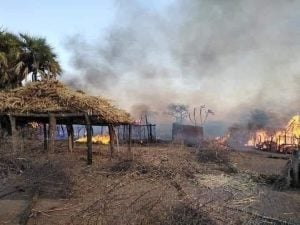 On April 2, 2022, 6 people were killed in South Darfur by the same tribal RSF/Janjaweed militia. Additionally, 8 herders were killed as well as 5 wounded, including 3 women, in Martal, Eastern Jebel Marra.
On April 2, 2022, 6 people were killed in South Darfur by the same tribal RSF/Janjaweed militia. Additionally, 8 herders were killed as well as 5 wounded, including 3 women, in Martal, Eastern Jebel Marra.
For the last 3 months, some 400 people were killed in Jebel Moon, Western Darfur. 10,000 were forced to flee after their homes were destroyed. They were internally displaced or sought refuge in neighboring Chad.
On April 7, 2022, Sudan United Movement forces lost a Deputy Brigade Commander with 5 of his soldiers defending villagers from RSF/Janjaweed militias attacks in Adikong, Western Darfur Region. Armed with just AK-47s they fought for 3 consecutive days facing 70 pickup trucks of RSF/Janjaweed militia equipped with heavy weapons, reinforced by motor-cycles, horses, and camels.
These attacks are carried out by the RSF/Janjaweed militias, while Sudan’s military junta deny these facts, saying that such attacks are carried out by outlaws or a third party. Following such razzias in Darfur by the RSF/Janjaweed, they falsely claim they will constitute a judicial committee to investigate an incident when such attacks are carried out. In reality no one has ever seen a result of any investigation. The RSF/Janjaweed militias continually commit these atrocities; surprisingly, no one questions them about their crimes.
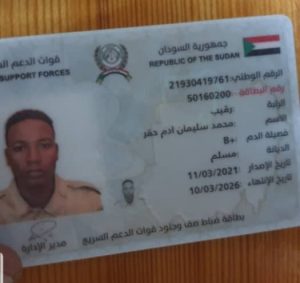
Sudanese social media reported Hemeti with Russian assistance have surveyed Darfur by satellite and may have discovered significant gold and uranium deposits in the areas of Jebel Amir, Jebel Moon, and Songo. With an ambition to exploit these resources, General Dogolo aka Hemeti of the ruling military Junta agreed with the Wagner Group to expel villagers from these areas so that they could bring in mining equipment and explore for minerals. Hufrah al Nahas area in South Darfur has uranium deposits. Since 2020, people have seen Russians frequently flying into the area using Sudan’s army helicopters.
Jihad erupts in Western Darfur: RSF/Janjaweed attacks Kireneck and Al Geneina
On April 24, 2022, Sudan’s RSF/Janjaweed militias attacked Kereinik town, Western Darfur Region. A Preliminary report indicated that the militias killed 201 people including children, women, elders and injured 98 others. They looted and burned the town including the market. The situation of the population is still unknown because the militias control the town. Searching for unidentified victims is in progress. This attack was planned and coordinated by Sudan’s transitional military junta.
The first attack was carried out by the RSF/Janjaweed militias on April 22, 2022, but the villagers repelled it while defending their town. On April 23, 2022, the government sent a mixed security force that included units from the army, the Reserve Police, RSF/Janjaweed militias and two warplanes covering these forces for air reconnaissance. They deceived the people by deploying around the town spreading fake news that they came to

provide security and people should descend from the mountain nearby and return to their homes. They told the people of warplanes making air reconnaissance to control the movements in the area surrounding the town.
According to sources on the ground, at 6 O’clock on the morning of April 24, 2022, an RSF/Janjaweed force of about 300 pickup trucks entered the town as part of the security force that was already deployed the previous day. That force withdrew and was replaced by newly arrived RSF/Janjaweed militias with 300 trucks. Then, they opened fire indiscriminately killing people. They were reinforced by another force of RSF/Janjaweed militias riding motor-cycles, horses, and camels while the two warplanes supervised the attack. They killed several civilians, looted their properties, destroyed their settlements, displacing 20,000 inhabitants. These attacks on Darfur villages are continuing in Darfur from Jebel Moon, to Fulani villages in South Darfur as well as Adikong in Western Darfur. As of the morning of April 25, 2022, RSF/Janjaweed militias attacked resistance forces signatories of the 2020 Juba Peace Treaty in the West Darfur provincial capital of Al Geneina. Fighting is continuing. We appeal to the international community to investigate these wanton genocidal attacks against Darfur’s indigenous people and undertake ways to protect them.

Conclusion
Sudan is clearly a failed state as the military junta and their supporters control only the presidential palace precinct. All while there is no functioning government that could enforce public security and safety of its citizens. Lawlessness prevails in Darfur, the other conflict areas, and in Khartoum. There, criminal groups raid homes and rob people of their belongings. Robberies and looting persist during daylight in the Souk al Arabi the (central market of Khartoum). Dinka homes in Kodoro, Khartoum North are frequently burned because junta supporters hate them. The RSF/Janjaweed militias are the real threat to peace and stability. They disrupt Sudan’s transition to a democratic civilian authority. The UN Security Council should pass a resolution to disarm and dismantle RSF/Janjaweed militias. The US Senate and House of Representatives, Foreign Relations and Affairs Committees should follow up the US Treasury OFAC sanctions of Sudan Regional Police Corps (CRP) with oversight hearings recommending sanctioning the Military Junta, the RSF/Janjaweed militias, withdrawing financial debt relief, other than providing for humanitarian assistance.
Lt. General (ret.) Abakar M. Abdallah is a native of Darfur and was a US trained Senior Intelligence officer in the Republic of Chad Army and commander of a multi-nation Pan-Sahel Counterterrorism Unit. He is currently Chairman of Sudan United Movement.
Jerry Gordon is Senior editor at New English Review.
Follow NER on Twitter @NERIconoclast